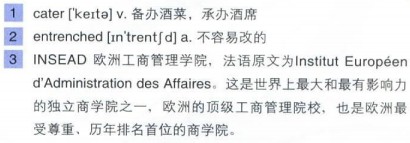作者是从美国南加州大学毕业的MBA,后留校任教师。他迄今已在中国工作、生活了四年。在华期间,他曾任上海交通大学MBA课程的全职老师,在纽约大学上海交流中心授课,并给在华的外国企业提供跨文化管理咨询。他用自己的亲身经历讲述了对中国式教育的看法。
美式发音 适合精读
 Only technical knowledge coupled with well-developed critical and creative thinking skills can help us regain our innovative edge. China’s traditional lack of emphasis on teaching these skills could block its efforts to develop its own innovative economy.
Only technical knowledge coupled with well-developed critical and creative thinking skills can help us regain our innovative edge. China’s traditional lack of emphasis on teaching these skills could block its efforts to develop its own innovative economy.
I once had my Chinese MBA students brainstorm on “two-hour business plans.” I separated them into six groups, gave them detailed instructions and an example: a restaurant chain. The more original their idea, the better, I said—and we’d vote for a prize winner.
In the end, five of the six groups presented plans for, you guessed it, restaurant chains. The sixth proposed a 1)catering service. Why risk a unique solution when the instructor has let it slip he likes the food business?
Though I admitted the time limit had been difficult, I expressed my disappointment and said once more what I had expected—originality—and why. But they’d been so enthusiastic that I couldn’t deny them a winner. After a polite discussion of the merits of each idea, the Haagen-Dazs gift certificates were awarded, but not without controversy. Runners-up later complained that an identical concept had been featured on CCTV the night before.
My students weren’t recent college grads. They were middle managers, financial analysts and financiers from State-owned enterprises and multinational companies. Most were intelligent men and women. They were not without talent or opinions, but they had been shaped by an educational system that rarely stressed or rewarded critical thinking or inventiveness.
The scene I just described came in different forms during my two years at the school. Papers were often copied from the Web and the Harvard Business Review. Students frequently said that copying is a superior business strategy, better than inventing and innovating.
My Western-trained colleagues, both foreigners and Chinese, tell similar stories. It’s not that university students in the West hadn’t also needed coaching in critical thinking, but they weren’t so blindly locked into such a seemingly 2)entrenched style.
With this problem in mind, partnerships with institutions like Yale, MIT and France’s 3)INSEAD have been established. Ultimately for China, becoming a major world innovator—and by extension, a robust economic power—is not just about setting up partnerships with top Western universities or roping off elites and telling them to think creatively. It’s about establishing an intellectually rich learning environment for young minds.
只有当技术知识加上良好的批判性创新思维才能使我们恢复创新能力。中国历来不重视这些独立思考方式的教育,这会对中国创新经济的发展造成障碍。
我曾经在课堂上让我的中国MBA学生各抒己见,完成一个“两小时创业计划”。我将他们分成六个小组,作了详细的说明,并举了一个连锁餐厅的例子。我说:自己的创意越多越好,我们将投票选出优胜者并给予奖励。
结果,六个小组中有五个提交的计划相同,估计你已猜到了,都是连锁餐厅,第六个提议办饮食服务。既然老师已泄露了他喜欢餐饮行业,为什么还要冒险去提其他的计划呢?
尽管我承认这个作业因时间太短而显得有些难度,我还是向他们表达了我的失望之情,并再次说明我想看到的是原创性及原因。但他们情绪高涨,我只能评出优胜者。在与他们客气地讨论了每个计划的长处之后,我给他们颁发了哈根达斯礼品券作为奖励。但并非所有人都心服口服。后来第二名投诉,在前一晚中央电视台曾经播放过一个与冠军有相同理念的节目。
我的学生们并非刚刚毕业的本科生。他们是来自国企及跨国公司的中层管理人员、财务分析师及金融家,大部份是有聪明才智的人士。他们并不平庸,也不乏自己的想法,但他们经过一个不重视创新发明、不鼓励批判性思考的教育体系的培养,形成了如此的思维模式。
我刚刚描述的情景在我两年的教学经历中多次以不同形式出现。论文经常从互联网和《哈佛商业评论》上抄袭而来。学生们常说抄袭是最高级的商业策略,胜于发明和创新。
我那些受过西方教育的同事中,有中国人也有外国人,他们都有过相似的经历。这并不是说西方的大学生在批判性思维方面就不需要指导,但是他们不会如此盲目地被禁锢在这样一个一成不变的模式里。
正是由于意识到这个问题,与国外高等学府合作的联合机构已经建立起来,合作对象包括耶鲁大学、麻省理工大学、以及法国的欧洲工商管理学院。对中国来说,要成为一个世界上主要的创新型国家,进而成为经济强国,不能仅仅靠与西方顶级大学建立合作关系,或者搜罗精英,要他们拿出创新思维。靠的是中国必须为年轻人营造一个良好的智力培养学习氛围。
翻译:Wendy 
